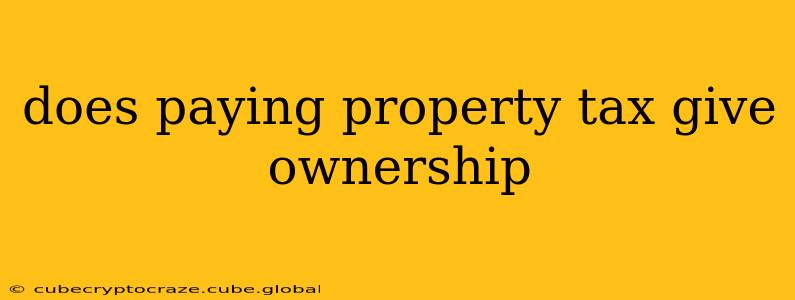Does Paying Property Tax Give Ownership?
No, paying property taxes does not give you ownership of the property. Property taxes are fees levied by local governments on property owners as a contribution to the costs of public services like schools, roads, and police and fire protection. Think of it like rent you pay to the government for the privilege of owning and using the land. Ownership is established through a completely separate legal process.
Let's break this down further:
What Establishes Property Ownership?
Property ownership is determined by a chain of title, a chronological record showing how ownership has transferred from one party to another. This chain is usually tracked through recorded deeds at the local county recorder's office or similar land registry. Key elements that establish ownership include:
- Purchase: The most common way to gain ownership is by purchasing the property from a previous owner, with the transfer of ownership documented in a deed.
- Inheritance: Property can be passed down through a will or intestate succession (laws governing inheritance when there's no will).
- Gift: Property can be gifted from one individual to another, again with proper documentation.
- Adverse Possession (Squatting): In rare cases, after a certain period of open, notorious, continuous, and exclusive possession, a person might be able to claim ownership. This is very complex and highly dependent on local laws. It's certainly not achieved simply by paying taxes.
What Happens if You Don't Pay Property Taxes?
Failure to pay property taxes has serious consequences. The government has the right to seize the property through a process called tax foreclosure. This means the government will sell the property at auction to recover the unpaid taxes. The original owner loses all rights to the property unless they can pay the back taxes and penalties before the sale.
What are Property Taxes Used For?
Property taxes fund essential local government services. These can include:
- Schools: Funding for public schools, teachers' salaries, and school facilities.
- Roads and Infrastructure: Maintaining roads, bridges, and other public infrastructure.
- Police and Fire Protection: Supporting local law enforcement and fire departments.
- Parks and Recreation: Maintaining parks, recreational facilities, and community programs.
- Libraries: Funding for public libraries and their services.
How are Property Taxes Calculated?
Property tax assessments are based on the assessed value of the property, which is usually determined by the local government. The tax rate is then applied to this assessed value to determine the annual tax amount. This can vary significantly from one location to another.
What is the Relationship Between Property Taxes and Ownership?
The crucial point is that property taxes are a consequence of ownership, not the cause of it. You pay taxes because you own the property. Failing to pay them can lead to the loss of that ownership. Therefore, paying taxes merely maintains your existing ownership, it doesn't create it.
